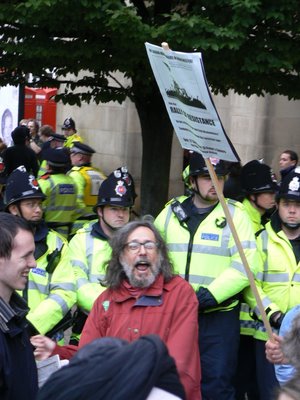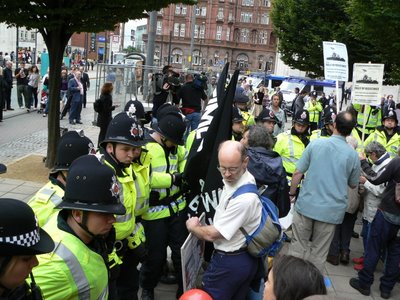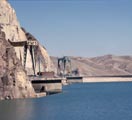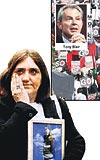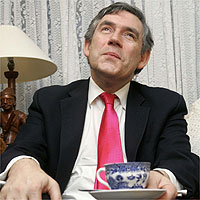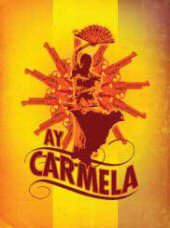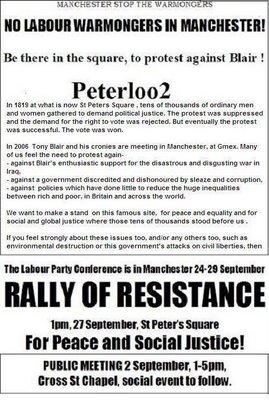
Following the Socialist Resistance AGM, which I attended as an observer, I was asked to write a short article for their paper about the war in Lebanon. Here is a sneak preview.
The recent war has been a disaster for Lebanon. Some 5000 dead, accompanied by destruction of the country’s economic infrastructure, an environmental catastrophe due to oil pollution, and the area south of the Litani river covered in cluster bombs. The responsibility for these atrocities lies with the Israeli Defense Force and its political masters. Nevertheless, Hezbollah also made political and military choices.
It has been transparent since 1973 that the USA will not allow Israel to suffer any catastrophic military defeat. Significant early advances by the Syrian and Egyptian armies during the Yom Kippur war were reversed by Israel only with massive US military support. What is more, there has also been a long tradition of guerrilla attacks on Israel being used to enhance the political and military prestige of competing Arab forces. For example, the promotion of guerrilla actions by Fatah during the 1960s, funded by Saudi Arabia, to undermine the Nasserite leadership of the PLO, and indirectly undermine the authority of pan-Arabism. There has also been a tradition, particularly during Yasser Arafat’s leadership of the PLO, of bargaining the suffering of civilian targets of Israeli aggression to gain diplomatic advantage.
The events of 12th July 2006 on the Israeli-Lebanon border will always be in dispute. It is entirely plausible that the IDF were anyway planning an attack on Lebanon. Nevertheless the nature, scale and ferocity of the Israeli response to Hezbollah’s military action would have been known to the Hezbollah leadership in advance. The fact that Hezbollah troops were dug in and had rockets deployed suggests that the action was a deliberate precipitation of war by Hezbollah.
The military defeat has created a political crisis for Ehud Olmert’s government, but it has not caused a general crisis of confidence in the Zionism, nor in a general questioning of the IDF’s capability. The confidence of Israel remains intact for the simple reason that the war did not undermine the central cornerstone of their defence, which is the backing of the USA.
No military or political struggle will prevail against Israel unless it also threatens the USA, which leads to a very simple question. Why was no voice raised in the Middle East calling for oil production to be halted? Even Hezbollah’s greatest ally, Iran, did not use its economic power.
In contrast, in 1973 the OPEC producers scaled production back 5%, then 10%, and then Abu Dhabi responded to President Nixon’s granting of $2.2 billion of military aid to Israel by initiating a total oil embargo. The embargo lasted for 6 months before Saudi Arabia broke the strike.
American domination of Middle East oil has rested on two pillars, unconditional support for both Israel, and the House of Saud. Having the Saudis as allies inside the Arab tent has decisively diverted the direction of Arab politics, but the House of Saud have also had to respond to their own pressures.
A crucial difference between 1973 and 2006 is that within the Arab world both the political left and Pan-Arabist nationalists have been substantially defeated. It was the Egyptian leader, Gamal Abdel Nasser who promoted the idea of "Arab oil for the Arab people", and was a constant threat to the Saudi monarchy. In 1955 there was an attempted uprising by pro-Nasser Saudi officers in Taif, and another attempt in 1956 in Dhahran, and in 1956 fifteen thousand oil workers went on strike in Arabia chanting Nasseite slogans. With CIA help the Saud family undermined Nasser both drawing him into a protracted proxy war in Yemen, and also undermining Nasser’s international prestige by promoting Fatah as leaders of the Palestinians.
Nevertheless, in 1973 King Faisal was under sufficient pressure from his own population, and was sufficiently fearful of Egypt’s new President Sadat reverting to Nasserism, that Arabia played a leading role in using the oil weapon to attack US support for Israel.
Pan-Arabism was historically defeated because it was predicated upon Arab states playing the super-powers, including Britain in the 1950s, off against each other; and this is no longer possible; also because of rivalry between the different Arab elites, for example between Nasser and Kassem of Iraq, about who would be the leader of the united Arabs. But most importantly, because the power of pan-Arabism lay in its ability to inspire the Arab workers and peasants that national unity would lead to solving their day to day impoverishment and misery. Yet awakening the working classes was the last thing the Nasserites or Ba’athists would ever do.
Zionism cannot be defeated without threatening the link between Israel the USA, and the key to isolating Israel is to use the economic power of the oil producers. Yet that oil is controlled by corrupt elites who depend on US support to survive. The task of the left is not to cheer lead for the Hezbollah, but to raise again the demand of Arab Oil for the Arab people, and to demand that the flow of oil be turned off in response to Zionist aggression.


